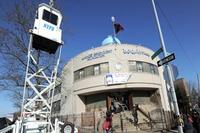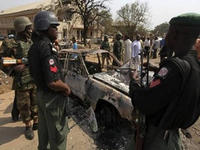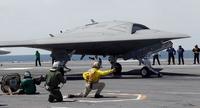-
Syria’s chemical weapons stocks will not be attacked
Military analysts say Syrian president Bashar Assad will emerge with Syria’s chemical arsenal intact if the United States executes a limited airstrike. The United States contemplates a punitive strike in response to Syria’s use of chemical weapons against Sunni civilians on 21 August – and on about a dozen earlier occasions – but the U.S. attack, if it comes, is not likely to include the depots where the chemical weapons are stored because such an attack may release deadly gases which would cover the neighboring areas with toxic clouds, potentially creating a human and environmental disaster.
-
-
NYPD designated all NYC mosques as terrorist organizations to facilitate broad surveillance

The New York Police Department (NYPD) secretly labeled entire mosques in New York as terrorist organizations, allowing the NYPD to use surveillance techniques including informants and spies without needing evidence or proof of criminal or terrorist activities to investigate the mosques. The investigations, known as Terrorism Enterprise Investigations (TEI), began after the 9/11 attacks on New York City and the Pentagon.
-
-
Flexible vehicle-arrest system stops cars involved in crime, terrorism

Researchers have developed a mathematical model that could help engineers design a flexible vehicle-arrest system for stopping cars involved in criminal activity or terrorism, such as suspect car bombers attempting break through a check point, without wrecking the car or killing the occupants.
-
-
Worries grow about Syria’s biological weapons capabilities, intentions
The debates among experts in Western and Middle Eastern intelligence services and militaries about the use of chemical weapons by the Assad regime revolve around how many times Assad has used chemical weapons, not whether such weapons were used. Neighbors of Syria have become increasingly alarmed – and, in private, have expressed their anxiety in discussions with the United States – about another illicit Syrian WMD program: biological weapons. The readiness of the Assad regime to use one proscribed weapon – chemicals — has led to growing unease among Syria’s neighbors that the regime may not find it too difficult to violate other weapon-related taboos. Biological weapons could give the Assad regime an effective means of retaliation because, if the weapon is well-designed, the lethal contents would spread easily without leaving tell-tale signs about the origin of the attack – or even evidence that there has been an attack.
-
-
Jewish Federations’ security arm stresses awareness on High Holidays
Security awareness should be a primary consideration for synagogues during the High Holidays, the security arm of the national Jewish community said. Synagogue staff, security volunteers and greeters should be on the lookout for suspicious persons or activity around their facilities, particularly during services and other gatherings,” the Secure Community Network (SCN) said in a statement posted Wednesday on its Web site, hours before the start of Rosh Hashanah.
-
-
Administration's Syria plan: limited operation with “downstream” effect
Three leading administration officials yesterday presented, in general detail, the plan of attack on Syria. The plan emphasizes the destruction of delivery vehicles – missiles, rockets, planes and their airfields, and artillery pieces – used in the delivery of chemical weapons. The three officials – Kerry, Hagel, and Dempsey — agreed that such an attack, even if its purpose would be to degrade the regime’s ability to deliver chemical weapons, would have “downstream” effect: these delivery vehicles also deliver conventional munitions, so their destruction would more generally degrade the regime’s ability to fight, thus making the battlefield between the regime and the rebels more level. The Senate Foreign Relations Committee is today drafting a new resolution which would permit up to ninety days of military action against the Syrian government and bar the deployment of U.S. combat troops in Syria but permit the deployment of a small rescue mission in the event of an emergency. The White House also would be required within thirty days of enactment of the resolution to send lawmakers a plan for a diplomatic solution to end the violence in Syria.
-
-
Fusion centers collect information on non-threatening groups

Since the 9/11 attacks, federal and state surveillance of nonviolent student groups, protest movements, and mosques has increased along with the growth of fusion centers. Fusion centers serve as the focal points for the receipt, analysis, gathering, and sharing of threat-related information. According to DHS, there are fifty-three primary fusion centers and twenty-five recognized fusion centers across the United States.
-
-
Kerry leaves no doubt: U.S. will attack Syria within days, no UN approval sought
In a speech today, Secretary of State John Kerry left no doubt that the Obama administration, within days at most, will launch a series of attacks against the Assad regime for attacking Syrian Sunni civilians with chemical weapons. The chemical attack – not the first one by the regime this year — killed 1,429 people, including 426 children. Kerry said punishing the offending regime was not only the right thing to do morally, but it is essential to protect U.S. national interest and the interests of U.S. allies. The administration has circulated a report, prepared by the U.S. and U.K. intelligence communities, detailing the evidence pointing to the Assad regime’ responsibility for the chemical attack. Kerry: we “make our own decisions on our own timelines, based on our own values and interests”
-
-
British Parliament vote complicates U.S. Syria plans (updated)
In a heavy defeat to Prime Minister David Cameron, the British Parliament voted against British military contribution to or involvement in an attack on Syria in response to the Assad regime’s use of chemical weapons last week. The vote is an embarrassing defeat for Cameron, and a major set-back for President Obama’s plan to put together a coalition of the willing to strike military targets in Syria. The parliamentary vote has no military significance, as the British contribution to the actual military operations would have been minimal at best. The U.K. vote, rather, is a political blow to the United States as it highlights on-going skepticism among Western publics – including U.S. public opinion — about yet another Western military involvement in the Middle East. The British vote is a blow to the United States more generally, as Britain has been the U.S. most loyal ally, and has taken part in every major U.S. military offensive in recent years.
-
-
U.S. military doubts purpose, efficacy of U.S. strike on Syria
The Obama administration’s plan to attack military targets in Syria is not greeted with enthusiasm by a U.S. military still carrying the scars of military involvement in Iraq and Afghanistan and facing deep budget cuts.Many in the military have reservations about a military action in Syria, with the main reservations concerning the potential unintended consequences of launching cruise missiles against Syria. Both supporters and opponents of a strike on Syria, though, agree on one thing: “Remember, with respect to policy choices concerning Syria, we are discussing degrees of bad and worse,” one officer said.
-
-
U.S. says Nigeria should do more to combat Islamist Boko Haram

The united States, in talks with Nigeria, says that Nigeria cannot fully achieve its potential as a stable regional leader until the country successfully overcome the challenge of the Islamic insurgency of Boko Haram and secure peace and protection for all its citizens in all regions. In 2012, the United States provided $647 million in bilateral foreign assistance to Nigeria.
-
-
Pentagon not likely to attack Syria’s chemical weapons depots
Administration officials say that the coming U.S. military strike against Syria – and it may be launched as early as tomorrow, Thursday – will aim not to change the regime, but to punish the Assad regime for using chemical weapons, and “deter and degrade” the ability of the regime to launch chemical weapons in the future. The attack will not be focused on chemical weapons storage sites, as American officials fear that such an attack may release clouds of toxic clouds into the air, possibly causing humanitarian and environmental disaster. Israeli intelligence analysts disagree, pointing out that the components of the chemical weapons are stored separately and assembled when an order is given – meaning that a strike on a chemical weapon storage facility will not trigger a chemical reaction. Whether or not Israel has been able to persuade the United States on this issue remains to be seen, but one thing is clear: if Assad decides to retaliate against Israel in the wake of an American strike on Syria, Israel will not hesitate to attack these storage facilities.
-
-
Cruise missile-only strikes have mixed record of success
If the United States limits its operation in Syria to cruise missile strikes, the operation will resemble similar attacks in the past – for example, cruise missile attacks in Afghanistan, Sudan, and Iraq in 1998. Cruise missile-only operations have had at best a mixed record of success. Experts note that Tomahawk missile strikes are politically and psychologically significant, but typically have a limited tactical effect.
-
-
New technology improves IED detection

Improvised explosive devices, or IEDs, are homemade bombs that can both injure and kill civilians and service members. One solution to the problem of IEDs is to find them before they explode by detecting the chemicals used in the explosives. Scientists at the U.S. Naval Research Laboratory (NRL) have developed a technology, using silicon to fabricate a sensor that may revolutionize the way trace chemical detection is conducted
-
-
U.S., allies prepare military strikes against Syria

Secretary of State John Kerry yesterday said that the use by the Assad regime of chemical weapons in attacks on civilians last Wednesday was undeniable. He said the Obama administration would hold the Syrian government accountable for this “cowardly crime” and “moral obscenity.” U.S. political and military leaders have been holding around-the-clock discussions with allies about a coordinated military attack on Syrian regime facilities. The United States, the United Kingdom, France, and Turkey said there was no need to seek a UN Security Council approval of military action against Syria, and that none will be sought. Administration lawyers have been crafting legal justifications for an intervention without UN approval that could be based on findings that Assad used chemical weapons and created a major humanitarian crisis. The U.S. Navy has moved more ships to the eastern Mediterranean, and activity has been stepped up in Britain’s air base in Cyprus.
-
More headlines
The long view
What Does Netflix’s Drama “Adolescence” Tell Us About Incels and the Manosphere?
While Netflix’s psychological crime drama ‘Adolescence’ is a work of fiction, its themes offer insight into the very real and troubling rise of the incel and manosphere culture online.
